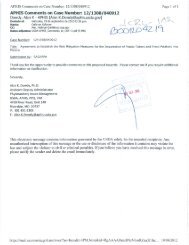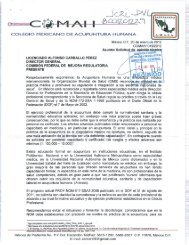Untitled
Untitled
Untitled
You also want an ePaper? Increase the reach of your titles
YUMPU automatically turns print PDFs into web optimized ePapers that Google loves.
S84<br />
from fat or high-fat/low-polyunsaturated fat foods resulting<br />
in 34.9% of energy from fat. Over 44 weeks, men in all<br />
groups lost weight (2.3, 1.4 and 1.8 kg respectively), with a<br />
0.5–0.9 kg greater weight loss for the low-fat group. In a<br />
randomized trial of 241 Dutch non-obese individuals with<br />
no intention to lose weight, free access was provided to B45<br />
different foods either in reduced fat or full fat version,<br />
covering between 30 and 40% of energy intake. The group<br />
that consumed the reduced-fat products had on average a 7<br />
energy percent lower fat intake and a 0.7 kg (95% confidence<br />
interval 0.1, 1.4) decrease in body fat over 6 months as<br />
compared with those that consumed the full-fat products<br />
(Westerterp et al., 1996; Weststrate et al., 1998). In the<br />
randomized CARMEN trial (Carbohydrate Ratio Management<br />
in European National Diets), diets high in carbohydrates<br />
were compared with a control diet that had a<br />
macronutrient composition that was typical for each<br />
country (Saris et al., 2000). The intervention was ad libitum<br />
and consisted of providing foods through a laboratory shop<br />
system in 398 men and women with a BMI between 26 and<br />
35 kg/m 2 . Allocation concealment and blinding procedures<br />
were not described and no intention-to-treat analysis was<br />
conducted. According to diet records intake of fat, protein,<br />
and carbohydrates changed significantly by 8.7, þ 2.7 and<br />
þ 6.3 energy percent for the low-fat high-starch group<br />
relative to the control group. Weight loss over 6 months<br />
was 2.6 kg for the low-fat high-starch group as compared<br />
with the control group. This weight loss was substantially<br />
larger than for the National Diet-Heart-Study, possibly due to<br />
the greater contrast in fat intake, the higher protein intake<br />
for the high-starch diet relative to the control diet or to all<br />
the CARMEN participants being overweight. Furthermore, in<br />
the CARMEN study participants were not blinded and the<br />
high-starch diet required a substantial change and reconsideration<br />
of dietary habits, whereas the control diet was<br />
similar to the usual dietary intake.<br />
In all trials discussed above, full-fat foods were replaced by<br />
reduced-fat versions of the foods. One could argue that the<br />
observed small effects of this product change on body<br />
weight may be worthwhile on a population level. However,<br />
exchange of reduced-fat foods for full-fat versions may<br />
reflect the effect of reducing the amount of energy per<br />
portion without substantially changing the participants’<br />
perception of the satiety value of the food. Thus, findings<br />
do not necessarily apply to exchanging carbohydrates for fat<br />
and replacement of full-calorie carbohydrate foods with<br />
reduced-calorie versions may have similar effects.<br />
Observational studies of carbohydrate intake and body weight<br />
Cohort studies of fat intake and long-term weight change. As<br />
reported in section 1.2, observational studies of dietary<br />
intakes and body weight are prone to various biases. People<br />
tend to hold particularly strong ideas about the effects of the<br />
proportion of fat or carbohydrate on body weight favoring<br />
for example commonly recommended low-fat diets or<br />
European Journal of Clinical Nutrition<br />
Carbohydrate intake and obesity<br />
RM van Dam and JC Seidell<br />
popular low-carbohydrate diets. A person’s ability to adhere<br />
to the macronutrient composition of such a diet is likely to<br />
be associated with a person’s ability to control total energy<br />
intake. Therefore, an association between the proportion of<br />
carbohydrates in the diet with lower weight or less weight<br />
gain may well be confounded by the ability to control energy<br />
intake. Other methodological issues include selective underreporting<br />
of fat intake that is related to weight and residual<br />
confounding by other dietary factors (Seidell, 1998). Results<br />
from prospective cohort studies that study the proportion of<br />
energy from fat in the diet (and thus indirectly the<br />
proportion of energy from carbohydrate in the content)<br />
have been inconsistent (Seidell, 1998). In addition to the<br />
aforementioned methodological limitations, differences in<br />
results may relate to differences in genetic susceptibility. In<br />
two cross-sectional studies, the association between fat<br />
intakes and adiposity differed by peroxisome proliferatoractivated<br />
receptor-a Pro12Ala genotype (Memisoglu et al.,<br />
2003; Franks et al., 2004). This variant also modified the<br />
weight loss as result of a lifestyle intervention (Lindi et al.,<br />
2002), but not the response to an energy restricted high or<br />
low-fat diet (Sorensen et al., 2006).<br />
Weight control registry. The National Weight Control Registry<br />
is a registry of persons in the US that maintained a weight<br />
loss of 13.6 kg or more for at least 1 year (Phelan et al., 2006).<br />
The majority of these successful weight losers consumed a<br />
low-fat, high-carbohydrate diet, but the average percentage<br />
of energy from carbohydrates had decreased from 56% in<br />
1995 to 49% in 2003, and the proportion of persons on a<br />
low-carbohydrate diet (o90 g/d carbohydrate) increased<br />
from 5.9 to 17.1% during that period (Phelan et al., 2006).<br />
These results indicate that the diet associated with weight<br />
loss at a certain point in time is to some degree dependent on<br />
the types of diet that are generally believed to be beneficial<br />
for weight. Still, these registry data support the findings from<br />
intervention studies that substantial weight loss is possible<br />
over a wide range of macronutrient compositions of the diet.<br />
Conclusions on the carbohydrate content of the diet<br />
Findings from the dietary intervention studies discussed<br />
above suggest that similar weight loss can be achieved over<br />
the course of a year with diets of substantially different<br />
carbohydrate contents. Positive energy balance and weight<br />
gain can be achieved with a wide range of energy percentage<br />
of carbohydrates in the diet; thus, neither a diet with a high<br />
nor a low energy percentage of carbohydrates will necessarily<br />
protect a person from weight gain on the long term.<br />
In trials in which dietary advice for weight loss was<br />
provided in overweight persons in the US and New Zealand,<br />
weight loss was greater after 6 months for low-carbohydrate<br />
diets as compared with low-fat diets, although this difference<br />
greatly attenuated after longer follow-up (Nordmann et al.,<br />
2006; Gardner et al., 2007). Interestingly, in the European<br />
CARMEN trial in which macronutrient intake was manipulated<br />
by providing foods through a laboratory shop system,
















